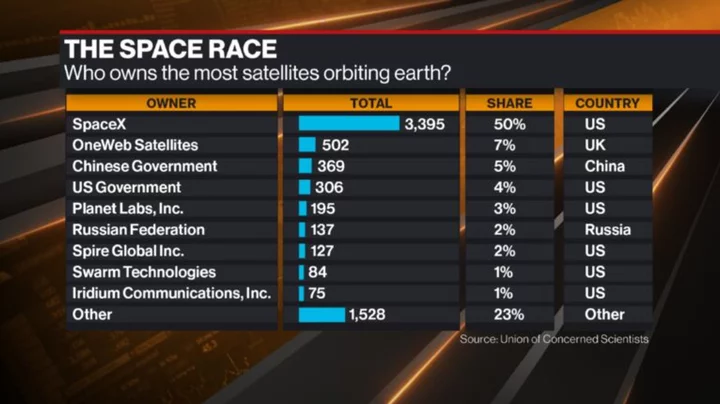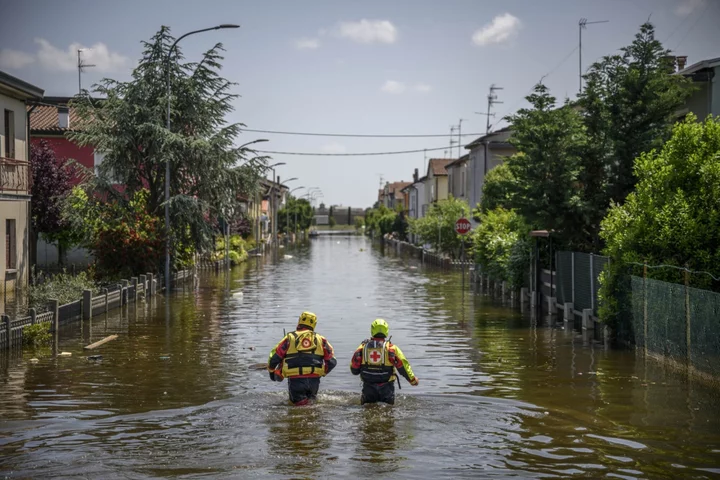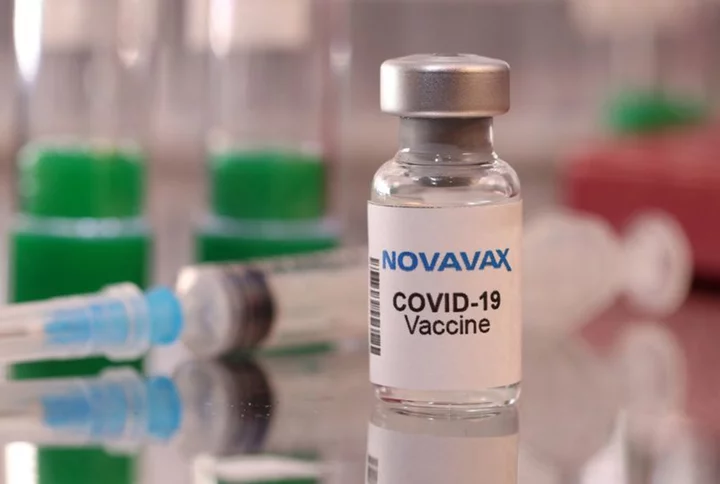
Amazon’s SpaceX Duel Heats Up as Tardy Satellites Set to Fly
Amazon.com Inc. is poised to launch its first two test satellites for Project Kuiper on Friday, as Jeff
2023-10-06 07:20

Kelly Ripa praises benefits of going through menopause: ‘I love not getting my period’
While women have long complained about the negatives of menopause, Kelly Ripa has recently discovered one benefit of going through the process. In a recent episode of her podcast, Let’s Talk Off Camera With Kelly Ripa, the Live With Kelly and Mark host discussed an under-appreciated aspect of menopause that she recently experienced herself. “I love not getting my period,” Ripa, 53, told her podcast guest and her real-life hormone doctor, Dr Erika Schwartz. The TV personality said that she experienced the beginning of menopause during the Covid-19 pandemic. Menopause, according to the Mayo Clinic, marks the time in a person’s life when their menstrual cycle ends and they no longer get their period. However, Ripa recalled the moment she learned of a main upside to menopause - the ability to wear white pants without fear of getting her period. “My first Memorial Day through Labor Day after menopause… it was the summer of the white pants because I never had to worry about wearing white pants,” Ripa recalled. The All My Children alum went on to speak with Dr Schwartz about the misconceptions of menopause, and how many people still consider the topic to be taboo. “People still whisper the word menopause,” she said, adding that “the information is still so hidden”. Her hormone doctor agreed, noting that “we’re still in the Dark Ages” when it comes to menopause and described the process as “like a bad secret”. Ripa said that even her friends of the same age are in denial going through menopause. She revealed that some of her friends routinely “tell me they still get their periods regularly”, while others consider the process to be “embarrassing”. “They’re talking to me, an open book, and still cannot bring themselves to talk about having gone through menopause. It is too scary for them to acknowledge,” she said. Dr Schwartz maintained that some women have trouble opening up about menopause because they feel it’s a sign that they’re “no longer useful” in society. “Because, in this day and age, there’s still a lot from yesterday’s day and age that has permeated the society and culture,” the doctor said. “And we think that being aged beyond menopause, we’re no longer useful.” “The moment you’re no longer fertile, you’re not useful,” Dr Schwartz continued. “I think you’re very useful. That’s when you have the information, the experience. You have so much to bring to the table, that I think every woman should feel great about herself.” Ripa has been married to husband Mark Consuelos since 1996. The longtime couple share children Michael, 26, Lola, 22, and Joaquin, 20. The TV host previously revealed that when she first started going through menopause, she mistakenly thought that she was pregnant. Speaking to Haute Living about her book, Live Wire: Long-Winded Short Stories, in 2022, she recalled the moment she believed her husband had accidentally “got [her] pregnant”. “I started taking pregnancy tests daily, but then Mark sort of gingerly said: ‘Could there be another reason why you’re not getting your period?’ and me saying: ‘What other reason could there possibly be?’ He really had to walk on eggshells here [by explaining to me that I was probably going through menopause],” Ripa said. However, she ultimately felt relieved that she wasn’t pregnant. “I was really grateful that I was not going to have to explain to my kids that they were about to meet their new sibling,” she joked. Read More Kelly Ripa says she thought she was pregnant when she first started going through menopause Viewers applaud Kelly Ripa and husband Mark Consuelos’s ‘great chemistry’ after Live co-hosting debut Kelly Ripa says she worked out of a janitor’s closet for years before ABC gave her a permanent office Teenager received a ‘zero’ at school because he didn’t have class supplies As transphobic hate crimes rise by 11% in a year, how to be a better ally All the big-ticket celebrity donations to Selena Gomez’s Rare Impact Fund Benefit
2023-10-06 04:55

As transphobic hate crimes rise by 11% in a year, how to be a better ally
Transgender hate crimes have increased by 11% in England and Wales, according to new data. Statistics from the Home Office found transgender hate crimes increased by to 4,732 offences in the year ending March 2023. The rise could be partly down to public discussion by politicians, the Home Office said. “What we’re seeing in today’s Britain is a horrifying reality of anti-trans narratives that are spreading across media and from high profile politicians, and the Home Office themselves have admitted it is a likely cause of rising violence,” Robbie de Santos, director of external affairs at LGBTQ+ charity Stonewall, told the PA news agency. “We can’t be complacent about any sort of divisive or dehumanising rhetoric, or failure to deliver on policy to protect our communities. “As a survivor of a violent attack myself, I want everyone to know you’re not in this alone. We’ve proven time and time again, that when we come together as a community we can demand and create true change.” The data comes a day after the prime minister Rishi Sunak weighed in on the debate around transgender rights at the Conservative Party Conference. “We shouldn’t get bullied into believing that people can be any sex they want to be. They can’t, a man is a man and a woman is a woman. That’s just common sense,” Sunak said. Health Secretary Steve Barclay used his speech at the conference to propose a ban on trans women from female NHS wards. With many members of the transgender community feeling threatened, what can you do to support anyone struggling? Ambassadors for LGBTQ+ young people’s charity Just Like Us share their advice for allies… Talk about it Your loved ones may not know anyone who is trans, or understand what it means to be transgender. “I need friends and family to keep talking and taking a stand against transphobia,” explains Charlie Hall, 25. “Talk about it with your colleagues, friends and family. Trans people are a small minority and allies need to take action, show others that trans people exist and are just trying to live their lives.” Matty Robins, 20, adds: “Personally, my friends reposting Instagram posts from transgender people in need, or anything about Trans Day of Visibility [March 31] or Trans Day of Remembrance [November 20], for example, has been one of the biggest displays of allyship to me.” Reach out Every trans person may be facing something different. “Ask us how you can support us. Every person is an individual and reacts differently to the situation and therefore needs different kinds of support,” explains 22-year-old Carden Cappi. Challenge hate and discrimination “Trans people need allies standing up for us,” explains Robins. This could include: “Correcting people when they deadname (using the name someone was assigned at birth) or misgender a trans person, whether the trans person is there or not. Fighting for trans inclusion at school, university and in the workplace.” Instead of “calling out” someone, which Robins says can be “inflammatory and cause people to turn away from transgender allyship”, he recommends talking to them about what they just said. “They may not mean it or understand how something they say is perceived as transphobic.” Be willing to learn “Friends and family can be supportive by educating themselves,” explains Charlie Middleton, 24. There are lots of resources out there to help you learn more about the trans community. Books like The Transgender Issue by Shon Faye (Penguin, £10.99) and Juno Dawson’s The Gender Games: The Problem With Men and Women, From Someone Who Has Been Both (Two Roads, £10.99) are well worth a read. You can also follow trans activists on social media – including Charlie Craggs and Munroe Bergdorf – to learn more about the community. Read More Impact of relationships with AI chatbot programmes ‘worrying’, psychologist says Pokemon’s Detective Pikachu Returns and more top games of the week How to talk to kids about cigarettes and vapes, following Rishi Sunak’s smoke-free generation plans 4 must-have denim trends for autumn, from wide-leg jeans to split skirts Doorscaping: How to create a fabulous front door display for autumn More than a quarter of middle-aged women living with ‘metabolically healthy obesity’ – study
2023-10-06 00:21

Taylor Swift VIP concert and Paul Rudd movie night: The celebrity donations to Selena Gomez’s Rare Impact Fund
Selena Gomez has launched her inaugural Rare Impact Fund Benefit auction, and many A-list celebrities donated big-ticket events and items to raise funds for mental health awareness. On 4 October, the Rare Beauty founder celebrated the first annual Rare Impact Fund Benefit: A Night of Radiance and Reflection in Los Angeles. The event supported Gomez’s non-profit organisation, the Rare Impact Fund, which works to reduce the stigma surrounding mental health and expand access to mental health services and education for young people. Not only did the sold-out event help raise money towards the Rare Impact Fund’s mission of mental health awareness, but it was also attended and supported by a number of star-studded celebrities. Martin Short, Gomez’s Only Murders in the Building co-star, served as emcee and auctioneer for the evening. Of course, the legendary comedian didn’t stray from making the occasional joke or two. “I am proud to call Selena Gomez my friend, and not because she’s successful or rich; because she’s both,” said Short, per the Hollywood Reporter. “What makes tonight very important is we’re here to support youth mental health awareness. I don’t think there’s anyone in this room that hasn’t been touched by mental health and its issues and the pain it can bring a family. We are here to raise urgent funds for the young people who need them.” The benefit also featured a special performance by Grammy-winning singer HER and a DJ set from music producer and Gomez’s “Wolves” collaborator, Marshmello. However, it was the number of big-ticket items and experiences donated by celebrities that were the main event. Perhaps the most notable donation came from Gomez’s longtime friend Taylor Swift, who donated VIP tickets to her Eras Tour concert, listed on the Rare Impact Fund Benefit’s auction site for the starting price of $5,000. The item is no longer available, according to the Hollywood Reporter, because it’s already sold for a staggering $15,000. Gomez’s fellow Only Murders in the Building co-star, Paul Rudd, also donated quite the fan experience - a movie night with none other than Rudd himself for $5,000. Other sold auction items included a glam session with Gomez’s stylists and lunch with Camila Cabello. Pro soccer star Lionel Messi donated a signed jersey, which may explain Gomez’s meme-worthy attendance at his Inter Miami game in Los Angeles earlier this month. The Argentine player’s jersey is still available to bid for $6,000. Other items that have not yet been sold include VIP tickets to Luke Combs’ “Growin’ Up and Gettin’ Old” tour in Los Angeles, a signed banjo from Steve Martin, a luxury five-night Airbnb getaway to Mexico, and a four-night stay at the Four Seasons Resort in Maui. Gomez took the stage at the Rare Impact Fund Benefit on Wednesday, where she spoke about her own struggles with mental health. “This has been the culmination of a lifelong dream for me, but it has also stemmed from some of the darkest moments in my life,” the former Disney Channel star told attendees. “I struggled with the world inside my head for a long time and I felt lost and I felt hopeless at times. In 2020, I received my diagnosis of bipolar disorder and, to be honest, everything quickly changed,” she continued. “I actually got the knowledge and the answers I had been desperate for for so long, and understanding that obviously makes me become more aware of it, and I’m less afraid than I used to be. “With that knowledge, I could seek out the support I needed to be myself, to find my joy again, and tonight I’m very proud to say that I have. I’m working really hard every day and I’m so happy just to be alive and be here with you guys today.” The Rare Impact Fund, which Gomez founded in 2020, has a goal of raising $100m in the next 10 years to expand access to mental health services and education for young people around the world. While the “Lose You to Love Me” singer acknowledged that her mission “probably sounds really absurd,” she noted that it’s people like her little sister, Gracie, and “the world that she and her generation inherits” that inspires her to make the world “a kinder one, a clearer one, a more connected one, with support and access”. “It has been my ultimate dream to launch this fund and it’s probably the most important thing that I’ve ever done, and I just couldn’t be more proud of the Rare Impact team for the work that they’re doing,” Gomez added, before thanking the crowd for “everything you’re going to do tonight; it’s the hardest journey I’ve ever been on but by far the most rewarding”. Gomez first revealed she had been diagnosed with bipolar disorder - a mental health condition that causes episodes of mood swings - in 2020, when she appeared on Miley Cyrus’s Instagram Live series titled “Bright Minded”. During a wide-ranging interview with Rolling Stone published in November 2022, Gomez shared that she checked into a mental health facility in 2018 after experiencing her first bipolar episode. She opened up about the “dark” period in her “early twenties” when she “started to feel like I was not in control of what I was feeling, whether that was really great or really bad”. In her Apple TV+ documentary, My Mind & Me, Gomez described the fear she felt after receiving her bipolar disorder diagnosis. “When I first got out, I didn’t know how I’d cope with my diagnosis,” she recalled in the documentary, which was released last November. “What if it happened again? What if the next time, I didn’t come back? “I needed to keep learning about it,” she said of the condition. “I needed to take it day by day.” Gomez has also been open about her battle with the autoimmune condition lupus, which she was diagnosed with in 2014 and underwent a kidney transplant for in 2017. Read More Selena Gomez opens up about her mental health struggles: ‘Maybe it would be damaging to tell people who I am’ Selena Gomez opens up about bipolar diagnosis: ‘I’ve been to four treatment centers’ Selena Gomez reveals she may never carry children due to bipolar medication How to dress like Taylor Swift and Travis Kelce for Halloween 2023 NFL defends spotlighting Taylor Swift during Travis Kelce’s games Travis Kelce says the NFL is ‘overdoing it’ with their Taylor Swift coverage
2023-10-05 23:15

How to talk to kids about cigarettes and vapes, following Rishi Sunak’s smoke-free generation plans
Stopping the nation from smoking has long been a top priority for medical experts, families and governments, and PM Rishi Sunak has made his plans for the issues clear. At the 2023 Conservative Party Conference, Sunak said that the legal age for buying tobacco should rise every year from those born in 2009 in a bid to “try and stop teenagers taking up cigarettes in the first place”. He said: “A 14-year-old today will never legally be sold a cigarette” under new legislation he is proposing for England. The Prime Minister also said more must be done to “restrict the availability” of vapes to children, but what can be done by parents in the meantime? Here are the conversations to have with your children… The dangers of smoking “Starting smoking and vaping at a young age can have serious and long-lasting health consequences,” explains Dr Chun Tang, medical director and GP at Pall Mall Medical. “Nicotine is particularly harmful to developing brains. Young people are more vulnerable to nicotine addiction, which can lead to a lifetime of tobacco dependence. Nicotine impacts cognitive function and memory, potentially affecting academic performance. “Aside from the detrimental effect on cognitive ability as outlined above, smoking is, of course, a leading cause of various health problems, including lung cancer, heart disease, stroke, chronic obstructive pulmonary disease (COPD), and many others,” he says. “Smoking during adolescence can also interfere with the growth and development of the lungs, leading to reduced lung function. This can result in breathing difficulties and decreased physical performance.” The dangers of vaping Vaping isn’t a safe alternative, yet he sweet-smelling, plastic steam machines are rife. “Vaping is a relatively new phenomenon, and the long-term health effects are still not fully understood,” says Tang. “There is ongoing research to assess the potential long-term risks, including the development of chronic health conditions.” Vaping has been associated with various adverse health effects, including lung injuries, respiratory problems, and cardiovascular issues, he notes. “Some of the chemicals found in vaping aerosols can be harmful when inhaled into the lungs. “If a smoker takes approximately 15 puffs of a cigarette before putting it out, then we can safely assume that a 600-puff disposable vape is equivalent to around two packs of cigarettes. “Some reports suggest young people can get through as many as 7 vapes a week, the equivalent of 14 packets of cigarettes. “That is an enormous amount of nicotine and so we can expect to see the health risks posed by nicotine to be [more] exacerbated in vapers than smokers – which could be severely impacting cognitive function and affecting academic performance.” It’s essential, he says, for parents, educators, and healthcare professionals “to educate young people about the potential risks of vaping and smoking and provide support and resources for those who want to quit”. Don’t lecture them Try to be open and curious rather than defensive and angry if your child is smoking or vaping. Dr Kerry Irving, senior clinical psychologist at online mental health platform Kooth, says: “Approach any conversation to understand why the young person smokes or vapes rather than to lecture, as the latter can cause people to shut down.” Consider available supportThere may be resources online and in person that might help your child, from the NHS to TikTok creators tracking their quitting journey. “Suggest accessing external support – encourage the young person to see their GP or to make use of some of the free Stop Smoking initiatives online or in your local community,” Irving says. Be sympathetic to relapse Expect wobbles. If your teen or child is quitting smoking or vaping try to stop accept that overcoming an addiction is not easy and recovery is not linear. “Relapses are an important part of changing any behaviour long term,” says Irving. “You can help the young person learn from these by gently encouraging them to reflect on what went wrong and helping them plan for how to try again.” Read More Charity boss speaks out over ‘traumatic’ encounter with royal aide Ukraine war’s heaviest fight rages in east - follow live 4 must-have denim trends for autumn, from wide-leg jeans to split skirts Doorscaping: How to create a fabulous front door display for autumn More than a quarter of middle-aged women living with ‘metabolically healthy obesity’ – study
2023-10-05 19:56

Baby Polar Bears Can’t Get Enough Milk When Sea Ice Disappears
Polar bears may be struggling to nourish their young as melting sea ice forces some populations to fast
2023-10-05 19:48

Record Heat Is Unleashing Deadly Floods From US to Libya
Extreme heat is usually associated with drought and wildfires. But across five continents this year, it’s also unleashed
2023-10-05 18:53

Victoria Beckham based new perfumes on treasured memories
Victoria Beckham has revealed she based her new collection of fragrances on treasured memories with her husband David and their kids
2023-10-05 18:16

Novo Nordisk's Wegovy bonanza looms large in Denmark
By Maggie Fick COPENHAGEN The whirlwind success of weight-loss treatment Wegovy is providing a bonanza not just for
2023-10-05 14:52

Mother sparks debate after claiming her son received a ‘zero’ grade because he didn’t have classroom supplies
A mother has sparked a debate after revealing that her son received a “zero” from his teacher because he didn’t bring in “classroom supplies”. The parent, Shanitta Busby, shared a recent video to TikTok about her 13 year old, in which she explained that he recently started at a new school. She noted that, prior to the middle schooler’s first day, she bought him “new school supplies,” since the list of supplies needed was “a little different” than ones she’d seen before, and she “wanted him to be prepared”. Busby said that while her child’s first week at school went well, he came home the second week and told her: “My teacher said we need to have classroom supplies.” She responded to her son by saying it was strange that his teacher wanted him to have certain “classroom supplies”. “I’m like: ‘That’s weird, because we got you everything on the list that you would need for the class. And you’re not going to be using any classroom supplies,’” she recalled. “And so I left it at that.” However, according to Busby, the teacher later told her son that she’d “give [him] a zero if [he] didn’t turn in the classroom supplies”. While the parent questioned why her son was being graded for having the items, she said that she still went on to get the “classroom supplies,” which included things like tissues, Clorox wipes, hand sanitiser, pencils, Expo markers and red pens. Although she gave her son these supplies to turn in to his teacher, she said that the following week, her son “still had a zero”. She explained that when she emailed the teacher about the grade, she also claimed that parents shouldn’t be responsible for “supplying” the items needed in the teacher’s classrooms. “I email the teacher and I’m like: ‘Hey, I’m kind of concerned because my student has an 83 in the class, and everything else in the class is 100s and 98s. And he still have a zero for something called classroom supplies,’” she recalled. “I was like: ‘We bought the supplies anyways, but I don’t feel like it’s the parent’s responsibility to supply your classroom.’” She also told the teacher that she didn’t “think it was appropriate to assign a grade to students based on whether or not they’ve supplied” their teacher’s classroom. According to Busby, the teacher responded to the email by saying: “I appreciate an involved parent, and I’ll update his grade today.” However, the teacher didn’t address the parent’s concerns about the grade itself existing. @shanittanicole Am I doing too much? #fyp #school ♬ original sound - Snooze ❣️ “She said nothing about the fact that we shouldn’t have to supply your classroom with supplies,” she explained. “So I emailed the principal, I might be extra, but I just wanna see what’s going on. Why do I have to buy supplies for the classroom? In the comment, she clarified that she and her husband bought the supplies that were needed for his homeroom, as he’s in middle school. She then specified that the grade he got for “classroom supplies” was for only his math class. Busby later shared a follow-up video with a screenshot of her son’s grade in the class, noting that there were two different grades for his “supplies”. While he got 90 for his “homework/classwork,” in the “supplies section”, he initially had a zero under the “participation” for “supplies”. However, his zero was then updated to a 100, giving him a 98 in the class. She then emphasised why she contacted the principal about her son’s “supplies” grade, adding: “Why are you assigning a grade for additional school supplies for the classroom? That’s what was wrong to me.” In the comments of the two videos, which have received more than 1.5m views combined, many people came to the parent’s defence, noting that some parents can’t afford all classroom supplies, so children’s grades shouldn’t be penalised for that. “Classroom supplies are not graded. She is not to force parents to get it,” one wrote, while another added: “That is so unfair!! Especially for the kids whose parents CAN’T afford groceries let alone classroom supplies!!!” “Somebody has to buy supplies and it’s not fair to the teacher. BUT they pool the supplies because everyone can’t afford them. To grade that is ridiculous,” a third commented. On the other hand, some parents acknowledged that they would get certain school supplies for their children, and defended teachers from having to buy them. @shanittanicole Replying to @In the view Graded School Supplies Part 2 #fyp #school #xybca ♬ original sound - Snooze ❣️ “I will buy anything my kids’ teachers need. I usually send $200 through a cash app per 1/4. Teachers shouldn’t have to buy either,” one wrote, while another added: “The grade I don’t agree with! As a former teacher, I spent a lot of my personal money on supplies. New teachers don’t even get a stapler.” “Teachers don’t make anywhere near enough to supply everything for classrooms, like tissues if your kid has a runny nose. Or wipes to clean messes,” a third wrote. Speaking to Insider, Busby said she’s still waiting to hear back from the principal on how the situation is being handled. She also shared her belief that the school districts should be giving supplies needed in classrooms, rather than having parents or teachers pay for it. The Independent has contacted Busby for comment. Read More Six-year-old girl with special needs found wandering busy road after school sent her home Father praised after teaching his daughters how to set expectations when dating men A Georgia woman confided in a friend about her relationship’s ‘tough times’. Four days later she was dead Man inundated with criticism after judging mum on her phone Brian Austin Green details stroke-like symptoms caused by diet: ‘I couldn’t speak’ Woman reveals how she discovered she’s allergic to water
2023-10-05 06:26

US FDA authorizes Novavax's updated COVID shot, shares rise
By Sriparna Roy and Michael Erman (Reuters) -The U.S. Food and Drug Administration said on Tuesday it authorized an updated
2023-10-05 02:51

Brian Austin Green says he had stroke-like symptoms caused by his diet: ‘I couldn’t speak’
Brian Austin Green has revealed he suffered from stroke-like symptoms for four years that were ultimately caused by his diet. The Beverly Hills, 90210 alum, 50, recently opened up about his major health struggles - which included vertigo and ulcerative colitis - that led him to be bedridden for three months and unable to speak, read, or write. In an episode of the Sex, Lies, and Spray Tans podcast with Dancing With the Stars dancer Cheryl Burke, released on 2 October, Green revealed that it wasn’t until a “kinesiology and Eastern medicine” specialist discovered he had “internal inflammation” from his diet of gluten and dairy that he was able to take control of his health. “I spent four and a half years recovering from stroke-like symptoms without ever having had a stroke,” the Anger Management star said. “I couldn’t speak. I couldn’t read. I couldn’t write.” When asked by podcast host Burke if his “neurological” issues were a result of having vertigo - a sensation that the environment is spinning in circles - Green explained that his vertigo symptoms were just “one stage” of his health problems. “I had ulcerative colitis and then I had vertigo,” he said. According to the Mayo Clinic, ulcerative colitis is an inflammatory bowel disease that causes inflammation and ulcers in the digestive tract. “I was bedridden for like three months but both things were undiagnosable,” he continued. “Nobody could figure it out, all the specialists that I saw.” Burke asked whether his symptoms were a result of a car accident, seemingly referring to when Green and his ex-wife, Megan Fox, were struck in their vehicle by a drunk driver in December 2014. “No. It was dietary,” he replied. Despite getting an opinion from one of the top neurologists at Cedars-Sinai Medical Center in Los Angeles, and undergoing nearly 200 blood tests and two MRIs, his doctor was still unsure of what Green’s health issue could be. The actor recalled that his symptoms of “brain fog” were so bad that he once reintroduced his best friend of 25 years to his sister, who his friend had also known for more than two decades. Green shared that even reading Dr Seuss books to his children was difficult for his brain. “It was all undiagnosed by Western medicine, so I ended up having to finally find a doctor that is much more into, like, kinesiology and Eastern medicine,” he said. Once finding a specialist, the doctor told Green that his health condition was a combination of stress and consuming “gluten and dairy”, which caused “internal inflammation” in his system. These days, Green shared that he’s “fully recovered” from his stroke-like symptoms and his health has been “100 per cent” since then. Green is a father to five children. He shares son Kassius Lijah, 21, with ex-girlfriend Vanessa Marcil. The Desperate Housewives alum also shares sons Noah Shannon, 11, Bodhi Ransom, nine, and Journey River, seven, with ex-wife Fox. He and the Jennifer’s Body star were married from 2010 to 2021. In June 2022, Green welcomed his fifth child, son Zane Walker, with fiancée Sharna Burgess. Read More Brian Austin Green gets candid about how great co-parenting is with ex Megan Fox Brian Austin Green shuts down claim he’s a ‘bad father’ after defending Megan Fox over sons’ outfits Megan Fox hits back at US politician’s claim about her children’s clothes Woman reveals how she discovered she’s allergic to water More than a quarter of middle-aged women living with ‘metabolically healthy obesity’ – study Idris Elba reveals he’s been in therapy for over a year after work realisation
2023-10-05 00:51
